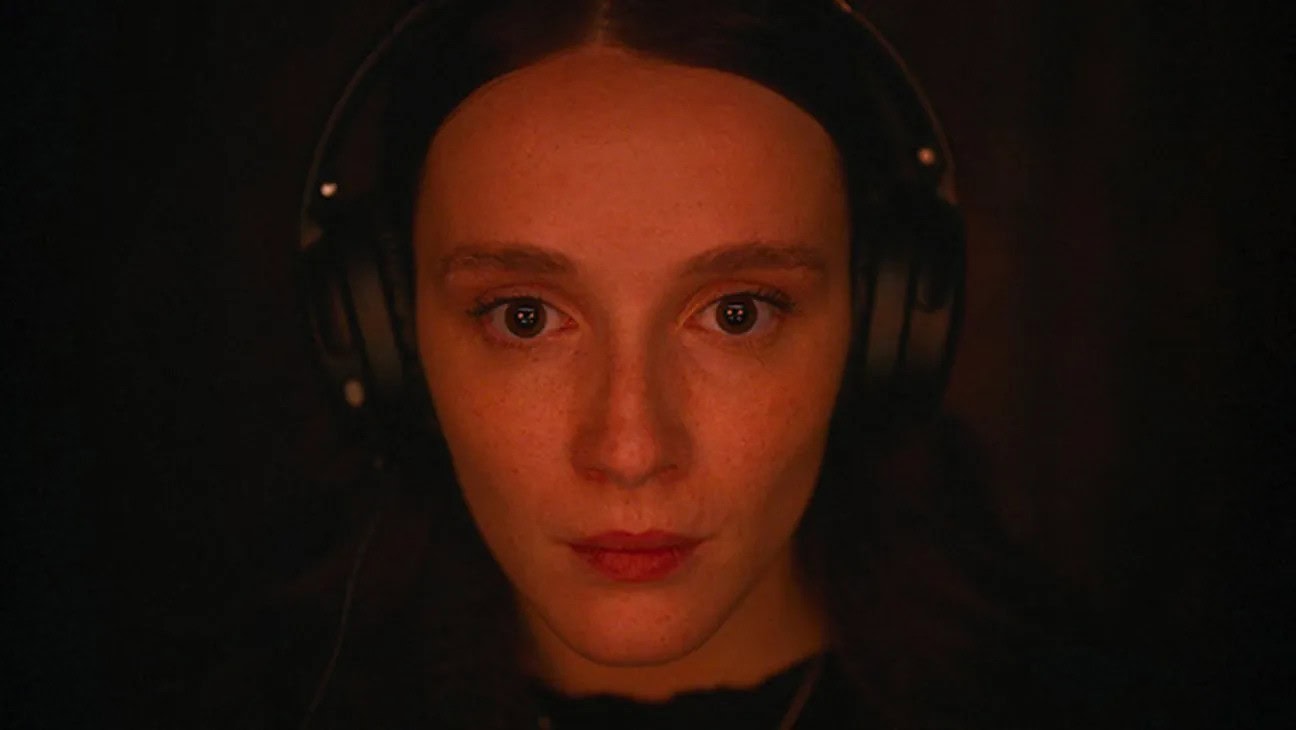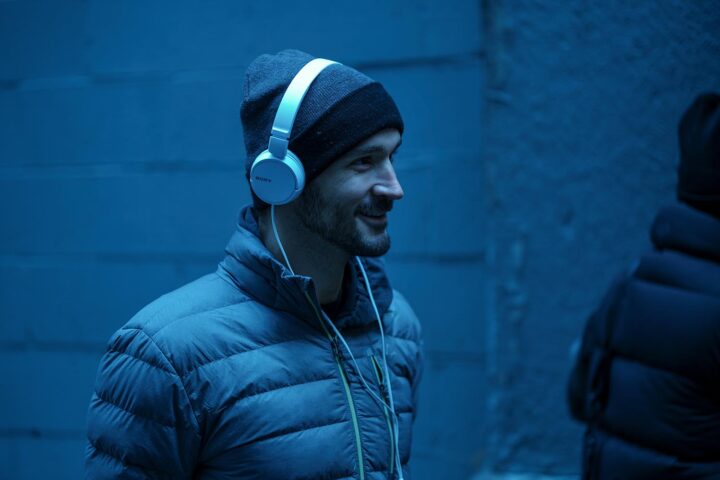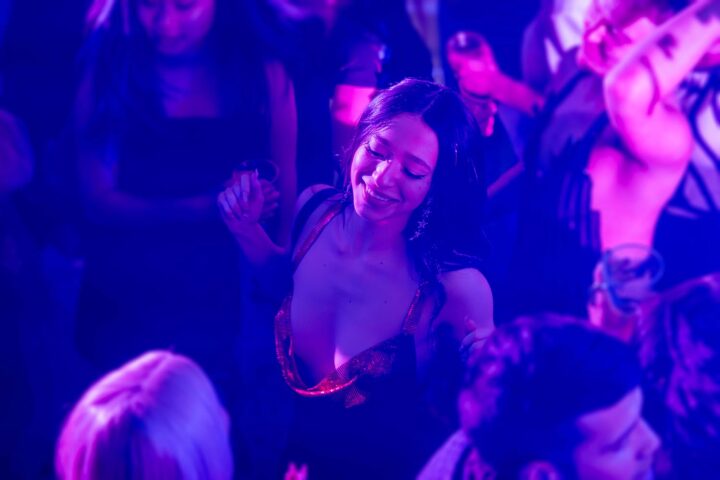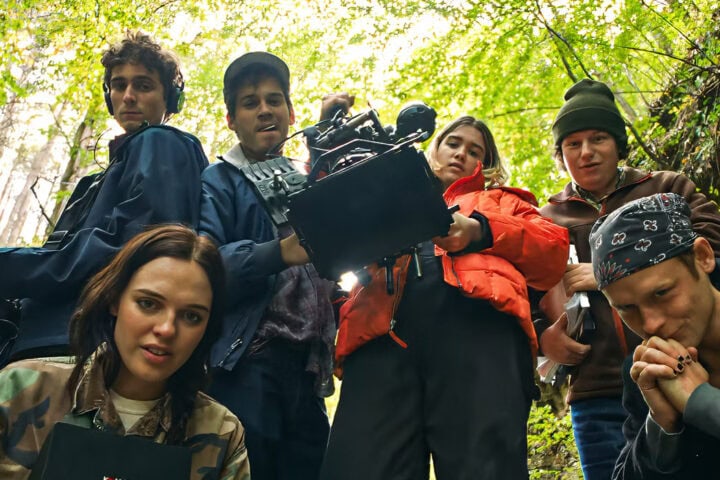Writer-director Pascal Plante’s Red Rooms opens with what sounds like a variation on the Handel music used in Barry Lyndon. Composer Dominique Plante’s eerie score is layered atop the pre-dawn routine of model Kelly-Anne (Juliette Gariépy) as she heads out not to work but a courthouse where a sensationalized murder case is set to begin. The trial concerns one Ludovic Chevalier (Maxwell McCabe-Lokos), who stands accused of the brutal murder of three teenage girls whose deaths were recorded for distribution on the dark web.
As opening arguments in the trial begin, Plante lays out a meticulous aesthetic of slow tracking movements and long takes. When the prosecutor shows the jury photos of the deceased, the camera doesn’t cut to the screen showing the dead girls, instead slowly moving toward one of the TVs displaying the images, circumventing a lurid fetishizing of their innocent faces. Only in a few, abrupt cuts to Kelly-Anne’s POV as she glances toward the victims’ families huddled in grief in the front row do we get a visceral quality to the proceedings, and even then it’s an insight into Kelly-Anne’s interest in the case over a prurient fixation on the case itself.
When Kelly-Anne leaves the courtroom, though, she finds that her own unseemly interest in the crime is reflected and magnified by the public at large. Reporters, barred from filming the trial, immediately swarm her and everyone else leaving the courtroom and bombard them with questions. The camera’s heretofore stately remove is replaced with handheld close-ups embodying the suffocating rush of TV crews, and the matter-of-fact details of the case laid out by the lawyers gives way to talk solely of emotions and opinions. A dazed Kelly-Anne can only mutter that she showed up because the case seemed interesting, but another of the court spectators, Clémentine (Laurie Babin), is far more willing to air her thoughts, calling the whole thing a travesty of justice and a railroading of Chevalier, whom she insists is innocent.
Together the women form an unusual bond, and Gariépy and Babin’s respective performances are fascinating temperature reads of the same obsession, only from opposite emotional registers. Babin plays the homeless Clémentine with a naked sense of over-investment in Chevalier that borders on the erotic. Clémentine’s voice grows soft when she talks about Chevalier, almost as if he were a friend, and she lashes out so reflexively at any presumption of his guilt that she even calls into a live panel show to castigate the hosts for joking about him.
In stark contrast, Gariépy plays Kelly-Anne as someone who approaches this whole circus with the intrigued but blank curiosity of a child pulling the wings off an insect. In early scenes, as Kelly-Anne checks her emails and messages with a blasé disconnect, Red Rooms is intensely aware of our always-on, always-plugged-in culture, and how, for Kelly-Anne, Chevalier’s trial seems to be just one more piece of content that flits across her field of view.
Given what she comes around to recognizing, Clémentine would to be the more obvious candidate to explore our modern-day true-crime obsession, but Plante comes to fixate instead on the nature of Kelly-Anne’s salacious rubbernecking of Chevalier’s crimes. In an unbroken medium close-up of Kelly-Anne and Clémentine staring at a computer as they play snuff films that Chevalier presumably recorded, Clémentine’s eagerness to use the movies as proof of Chevalier’s innocence crumbles in the face of the brutality of the taped murder. Her despondent reaction stands in sharp relief to Kelly-Anne’s strangely unresponsive but captivated visage.
From there, the film experiences an aesthetic shift that’s keyed to a change in Kelly-Anne’s being that most viewers may not see coming. Cuts between scenes elide over uncertain periods of time as Kelly-Anne loses track of the world around her, and the erstwhile slow progression of shots turns into a staccato barrage of disorienting close-ups. The soundtrack starts to buzz with overlapping noises of news broadcasts, web alerts, and voicemail messages from her concerned modeling agent reporting that her constant visibility at the trial is costing her gigs.
At times, Plante’s tricksy vision of an addled Kelly-Anne’s nose-dive into an especially macabre corner of the dark web recalls Olivier Assayas’s brief foray into New French Extremity with Demonlover. Like that film, Red Rooms interrogates how a mixture of desensitization and a desire to assert oneself as a protagonist of other people’s lives threatens to make content out of the vilest of humanity, and how the only thing preventing someone from being sucked down a moral whirlpool is to catch sight of their own zombified reflection on their computer screen.
Since 2001, we've brought you uncompromising, candid takes on the world of film, music, television, video games, theater, and more. Independently owned and operated publications like Slant have been hit hard in recent years, but we’re committed to keeping our content free and accessible—meaning no paywalls or fees.
If you like what we do, please consider subscribing to our Patreon or making a donation.






